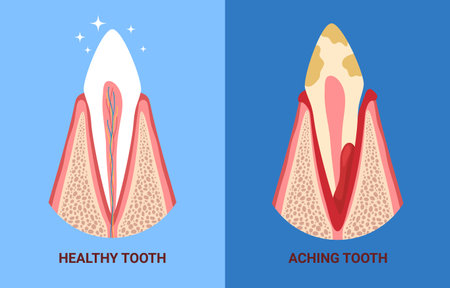1. Understanding Veneers: What They Are and How They Work
If you’ve ever dreamed of having a picture-perfect Hollywood smile, dental veneers might be the solution you’re looking for. Veneers are thin shells designed to cover the front surface of your teeth, enhancing their appearance by improving color, shape, and alignment. They are a popular cosmetic dentistry option because they offer a quick and effective way to achieve a flawless smile.
Types of Veneers
There are different types of veneers available, each with its own benefits and considerations. The two main types are:
| Type | Description | Pros | Cons |
|---|---|---|---|
| Porcelain Veneers | Custom-made thin shells crafted from high-quality porcelain. | – Natural appearance – Stain-resistant – Long-lasting (10-15 years) |
– Higher cost – Requires enamel removal |
| Composite Veneers | A more affordable alternative made from composite resin. | – Lower cost – Quicker application – Less enamel removal needed |
– Less durable (5-7 years) – More prone to staining |
The Process of Getting Veneers
The process of getting veneers typically involves several steps:
1. Consultation and Planning
Your dentist will assess your teeth and discuss your goals to determine if veneers are right for you.
2. Tooth Preparation
A small amount of enamel is removed from the front surface of your teeth to create space for the veneers.
3. Impressions and Customization
An impression of your teeth is taken to create custom veneers that match the shape and color of your natural teeth.
4. Bonding the Veneers
The veneers are carefully bonded to your teeth using a strong adhesive, ensuring a secure and natural-looking fit.
The Benefits of Veneers
Dental veneers can dramatically enhance your smile by correcting various cosmetic imperfections, including:
- Discolored Teeth: Cover stains that don’t respond to whitening treatments.
- Chipped or Worn Teeth: Restore the shape and size of damaged teeth.
- Slight Misalignment: Improve minor gaps and uneven teeth without braces.
- A Brighter Smile: Achieve a permanently white and polished look.
If youre looking for an affordable way to enhance your smile without undergoing extensive dental work, veneers can be a great option. With different materials and price points available, you can find a solution that fits both your needs and budget.
2. Exploring Affordable Veneer Options
Getting a stunning smile doesn’t have to cost a fortune. There are several veneer options available that can fit different budgets while still delivering impressive results. Let’s explore the most cost-effective choices, including composite and porcelain veneers, as well as alternative treatments that can enhance your smile without breaking the bank.
Composite vs. Porcelain Veneers: Which One is Right for You?
The two most common types of veneers are composite and porcelain. Each has its own advantages, and the right choice depends on your budget, aesthetic goals, and lifestyle.
| Type | Cost | Durability | Aesthetic Appeal | Maintenance |
|---|---|---|---|---|
| Composite Veneers | $250 – $1,500 per tooth | 5 – 7 years | Naturally white but may stain over time | Requires regular polishing and occasional repairs |
| Porcelain Veneers | $900 – $2,500 per tooth | 10 – 15 years | Mimics natural enamel with a highly aesthetic finish | More resistant to staining and requires minimal maintenance |
Alternative Treatments for a Hollywood Smile on a Budget
If veneers are outside your budget, there are other cosmetic dental treatments that can improve your smile at a lower cost:
Bonding
This procedure involves applying tooth-colored resin to fix chips, gaps, or discoloration. It’s an affordable alternative to veneers but may not last as long.
Teeth Whitening
If your main concern is discoloration, professional teeth whitening can significantly enhance your smile at a fraction of the cost of veneers.
No-Prep Veneers
No-prep or minimal-prep veneers require less alteration of your natural teeth and can be a more affordable option compared to traditional porcelain veneers.
Crowns for Severely Damaged Teeth
If you have severely damaged or weakened teeth, dental crowns might be a better long-term investment as they provide both protection and aesthetic improvement.

3. Finding a Trusted Dentist Without Overpaying
Choosing the right dentist for your veneers is crucial to achieving a beautiful smile without spending a fortune. While affordability is important, you don’t want to compromise on quality. Here are some tips to help you find a reputable dentist who offers high-quality veneers at reasonable prices.
Check Credentials and Experience
Not all dentists specialize in cosmetic dentistry, so its important to verify their qualifications. Look for a dentist with experience in veneers and cosmetic procedures.
- Check if they are accredited by organizations like the American Academy of Cosmetic Dentistry (AACD).
- Review their education, training, and years of experience in cosmetic dentistry.
- Ask to see before-and-after photos of previous veneer patients.
Read Reviews and Testimonials
Online reviews can give you insight into a dentist’s reputation and patient satisfaction. Consider checking platforms like:
- Google Reviews: Provides real patient experiences and ratings.
- Yelp: Offers detailed reviews on service quality and pricing.
- Dentist’s Website: Often features patient testimonials and case studies.
Compare Prices and Payment Plans
The cost of veneers varies depending on location, materials, and the dentist’s expertise. To ensure youre getting the best value, compare prices from multiple providers.
| Factor | What to Consider | How to Save |
|---|---|---|
| Dentists Experience | A highly experienced dentist may charge more but ensures better results. | Look for mid-level experienced dentists with good reviews. |
| Location | Dentists in big cities often charge higher fees than those in suburban areas. | If possible, consider traveling to a nearby city with lower costs. |
| Material Used | Porcelain veneers are more expensive than composite resin but last longer. | If budget is tight, ask about high-quality resin alternatives. |
| Payment Options | Some clinics offer financing or payment plans for veneers. | Select a clinic that provides affordable monthly payment options. |
Avoid Unrealistic Deals
If an offer seems too good to be true, it probably is. Be cautious of extremely low-cost veneer deals that may use subpar materials or lack proper expertise. Always verify the quality of work before committing.
Schedule Consultations Before Deciding
A consultation allows you to assess the dentists expertise and ask important questions about the procedure and pricing. Consider meeting with at least 2-3 dentists before making your final choice.
Questions to Ask During Your Consultation:
- What type of veneers do you recommend for my teeth?
- Can I see before-and-after photos of previous veneer cases?
- What is included in the total cost? Are there any hidden fees?
- Do you offer financing or payment plans?
- How long will the process take from start to finish?
Selecting a skilled and trustworthy dentist ensures that your investment in veneers pays off with a stunning smile that lasts for years. Taking the time to research properly will help you achieve your dream smile without unnecessary expenses.
4. Financing Your New Smile: Payment Plans and Insurance
Getting veneers can be a life-changing investment, but the cost may seem overwhelming at first. The good news is that there are several financing options available to help make your dream smile more affordable. Whether through payment plans, dental financing, or insurance coverage, you have ways to manage the expense without straining your budget.
Flexible Payment Plans
Many dental offices offer in-house payment plans that allow you to pay for your veneers over time instead of all at once. These plans typically break down the total cost into manageable monthly payments, making it easier to fit into your budget. Some offices even provide interest-free financing for a set period, helping you save money in the long run.
Dental Financing Options
If your dentist doesn’t offer an in-house payment plan, third-party financing companies can help cover the cost of veneers. Popular options include CareCredit, LendingClub, and Cherry, which provide flexible repayment terms and low-interest rates for qualified applicants.
| Financing Option | Key Benefits |
|---|---|
| CareCredit | No-interest promotional periods, easy approval process |
| LendingClub | Low fixed rates, longer repayment terms available |
| Cherry | No hard credit check required, quick application process |
Can Insurance Help Cover Veneers?
In most cases, dental insurance does not cover cosmetic procedures like veneers since they are considered elective treatments. However, if you need veneers for medical reasons—such as repairing damage from an accident—your insurance might cover part of the cost. It’s always a good idea to check with your provider to understand what benefits are available.
Tips for Maximizing Insurance Benefits
- Ask Your Dentist: Some dentists can submit a pre-authorization request to determine if any portion of the procedure is covered.
- Look for Medical Necessity Coverage: If veneers are needed due to tooth damage or structural issues, there’s a chance insurance may contribute.
- Use Flexible Spending Accounts (FSA) or Health Savings Accounts (HSA): These accounts allow you to use pre-tax dollars toward veneers and other dental treatments.
The Best Approach for Your Budget
The right financing option depends on your financial situation and how quickly you want to complete your treatment. Whether you opt for a payment plan through your dentist or secure third-party financing, exploring these options can make achieving your Hollywood smile much more accessible.
5. Maintaining Your Veneers for Long-Lasting Results
Getting veneers is an investment in your smile, and taking proper care of them ensures they stay beautiful for years. While veneers are durable, they still require regular maintenance and good oral hygiene habits. Here’s how you can keep your veneers looking flawless without unnecessary damage.
Daily Maintenance Tips
Just like natural teeth, veneers need daily care to maintain their appearance and longevity. Follow these simple steps:
- Brush twice a day: Use a soft-bristled toothbrush and non-abrasive fluoride toothpaste to avoid scratching the surface.
- Floss daily: Gently floss around your veneers to prevent plaque buildup and gum disease.
- Use an alcohol-free mouthwash: Alcohol-based products can weaken the bonding agent holding your veneers in place.
Avoiding Damage
Veneers are strong but not indestructible. To prevent chips, cracks, or other damage, keep these precautions in mind:
| Potential Risk | How to Prevent It |
|---|---|
| Biting hard objects (e.g., ice, pens, fingernails) | Avoid chewing on anything too hard to prevent cracking. |
| Teeth grinding (bruxism) | If you grind your teeth at night, consider using a nightguard. |
| Staining from coffee, tea, or red wine | Limit consumption or rinse with water after drinking dark beverages. |
| Poor oral hygiene | Maintain good brushing and flossing habits to prevent decay around the veneers. |
Regular Dental Checkups
Your dentist plays a crucial role in keeping your veneers in top shape. Visit your dentist every six months for professional cleanings and checkups. They can detect early signs of wear or damage and provide solutions before problems escalate.
Lifestyle Adjustments for Longevity
A few small lifestyle changes can significantly extend the lifespan of your veneers:
- Avoid smoking: Tobacco can stain veneers over time.
- Be mindful of acidic foods: Citrus fruits and vinegar-based dressings can weaken enamel and affect veneer adhesion.
- Chew carefully: If you love crunchy snacks, try breaking them into smaller pieces instead of biting directly.


